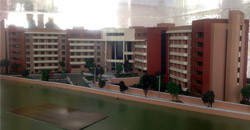Feb 18 2015
As R2CITIES fast approaches the end of year two, partners are developing what will determine the course of the project to its successful completion – an integrated design methodology for systemic energy efficient renovation of districts throughout Europe. This involves partners benchmarking and analysing the optimum combination of the technologies deemed suitable for each demo site.
 kartal
kartal
The work session on lifecycle analysis and costing (LCA/LCC) took delegates through the basics before focusing on how R2CITIES is applying the principles to the demo sites. A preliminary LCA is being conducted to support decision making the design phase of the interventions at all three demos (Kartal-Turkey, Genoa-Italy and Valladolid-Spain), and then full LCA will be applied using the monitoring data acquired after the demonstrations. Central to this procedure is data quality as too is the extent the municipalities involved can collect the data directly from the owners. The LCA results obtained will allow us to define criteria to compare the performance of retrofitted and non-retrofitted buildings using data on different materials used. We will then be able to scientifically assess our results and the energy savings achieved. Discussion centred on materials and how decisions about these need to be accounted for during the tendering processes.
Another topic under study was the design methodology involving the refinement of district sustainability indicators and the selection of renovation scenarios. To achieve this, R2CITIES is drawing on integrated project delivery and multi-criteria decision analysis since the number of sustainability indicators requires sound processing. The session first set out the framework applied and its three stages – district audit, optimal integral design, and evaluation – so that all the delegates could benefit from knowing more about this vital part of R2CITIES. Since the framework calls on various players, much of the session was then devoted to making progress on the “expert groups” that will each play a pivotal role in the delivery of the design methodology. These groups include owner/promoter representatives, design and execution team with BIM and energy experts, and technology suppliers. The ultimate aim of the session was to formalise and engage with the expert groups in evaluating alternative retrofit solutions and defining sustainability indicators.
Two other work sessions focussed on the deployment of a building/district management system and integrated project delivery. The sessions brought together the involved partners ahead of deployment that has to be completed by late 2015. The management system will be used to control energy generation, storage and use through an open-source platform such as a database server or reporting engine. Its main objective is to integrate all the methodologies, solutions and algorithms developed within the other work packages. The session on IPD focused on how integrated project delivery can be applied to the demo sites; discussion centred on the roles of energy specialists, BIM managers and quality plans.
Our periodic meetings therefore involve a hands-on approach where the fact of having all the partners together is leveraged to maximum effect. This is particularly crucial at this stage of the project due to the complexity of issues being tackled and the diversity of experts involved.